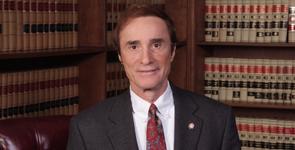News
Justice Stevens lauds law enforcement grads

May 16, 2014
Supreme Court Justice Correale F. Stevens praised the role law enforcement plays in Pennsylvania communities during a specialized training program commencement for deputy sheriffs at Penn State University.
Speaking before graduates of the Deputy Sheriff Basic Training Academy at Penn State’s main campus in State College, Justice Stevens noted the wide range of duties and versatility required in the profession.
“Pennsylvania law enforcement officers investigate, arrest, give directions, provide emergency aid and generally help keep our society from falling apart,” he remarked.
“Deputy sheriffs are a major important component of our criminal justice system,” he added. “From providing courthouse security to transporting criminals to serving legal process, our deputy sheriffs help maintain the peace and assist other law enforcement in protecting our citizens.”
The academy is run by Penn State’s Justice and Safety Institute under the auspices of the Deputy Sheriffs’ Education and Training Board. The board is administered by the Pennsylvania Commission on Crime and Delinquency. The program began at Penn State in 2000 after the Supreme Court expanded the duties of deputy sheriffs.
Deputy sheriff training involves receiving instruction from multiple law enforcement fields, ranging from lawyers and judges to state police and parole officers. The program includes firearms training, first aid and a few unconventional activities, like yoga.
All county sheriffs’ offices must send their deputies who have not completed sufficient police training to Penn State for the program.
Justice Stevens recalled how his grandfather Tony Stevens as a Hazleton city patrol officer on horseback once chased a purse thief by riding his horse right into a Hazleton area restaurant where he apprehended the thief in front of a group of surprised diners.
“While the judiciary must protect individual liberties, judges must never, ever make decisions that put our law enforcement officers’ safety at risk,” he said.
